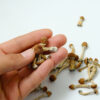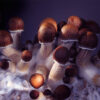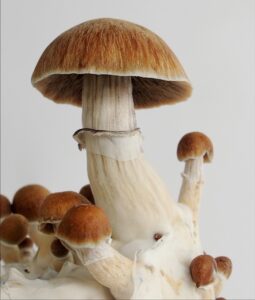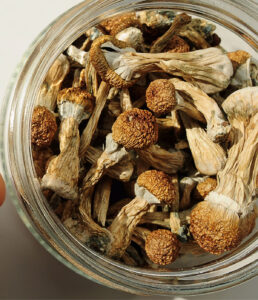Summary of research article by Shnayder et al., published in the Journal of Mental Health, on March 13, 2023.
A recent study has provided evidence that psilocybin-assisted therapy can significantly improve the psycho-social-spiritual well-being of cancer patients. The paper highlights the potential benefits of incorporating psilocybin, a naturally occurring psychedelic compound found in certain mushroom species, into therapeutic interventions for individuals diagnosed with cancer.
Cancer patients often experience a myriad of psychological challenges, including anxiety, depression, and existential distress. Traditional therapeutic approaches, such as counseling and medication, have had limited success in addressing these issues. In light of this, researchers have turned to alternative methods, including the use of psychedelic compounds like psilocybin, in an effort to improve the well-being of patients.
The study involved a double-blind, randomized, and placebo-controlled trial, which is considered the gold standard in clinical research. Participants were divided into two groups: one received psilocybin-assisted therapy, while the other received a placebo. The therapy sessions were conducted in a controlled and supportive environment, with trained therapists present to guide and support the patients throughout the process.
After the intervention, participants were assessed using various psychological measures, including the Hospital Anxiety and Depression Scale (HADS), the Functional Assessment of Cancer Therapy – General (FACT-G), and the Functional Assessment of Chronic Illness Therapy – Spiritual Well-Being (FACIT-Sp). The results showed significant improvements in the psilocybin-assisted therapy group, particularly in the areas of anxiety, depression, and spiritual well-being.
Anxiety and depression scores in the psilocybin-assisted therapy group decreased substantially, with patients reporting reduced feelings of fear, worry, and sadness. These improvements were maintained at follow-up assessments, suggesting that the positive effects of the therapy were long-lasting. Moreover, patients in the psilocybin-assisted therapy group also reported significant improvements in their overall quality of life, as measured by the FACT-G questionnaire.
In addition to the psychological benefits, the study also found that patients who underwent psilocybin-assisted therapy experienced a significant improvement in their spiritual well-being. As measured by the FACIT-Sp questionnaire, patients reported increased feelings of meaning, purpose, and connectedness after the intervention. This finding is particularly noteworthy, as spiritual well-being has been linked to better coping and reduced psychological distress in cancer patients.
The study also highlighted the importance of the therapeutic context in which psilocybin is administered. The researchers emphasized that the positive outcomes observed were not solely due to the drug’s pharmacological effects but were also influenced by the supportive and controlled environment in which the therapy took place. This highlights the need for well-trained therapists and carefully designed therapeutic protocols to ensure the safety and efficacy of psilocybin-assisted therapy.
In conclusion, this groundbreaking study provides strong evidence that psilocybin-assisted therapy can significantly improve the psycho-social-spiritual well-being of cancer patients. By reducing anxiety and depression, enhancing quality of life, and promoting spiritual well-being, this novel therapeutic approach has the potential to revolutionize cancer care and offer hope to those struggling with the psychological burdens associated with their diagnosis. As researchers continue to explore the therapeutic potential of psychedelic compounds like psilocybin, it is essential to prioritize rigorous clinical trials and the development of safe, evidence-based protocols to ensure the best possible outcomes for patients.








